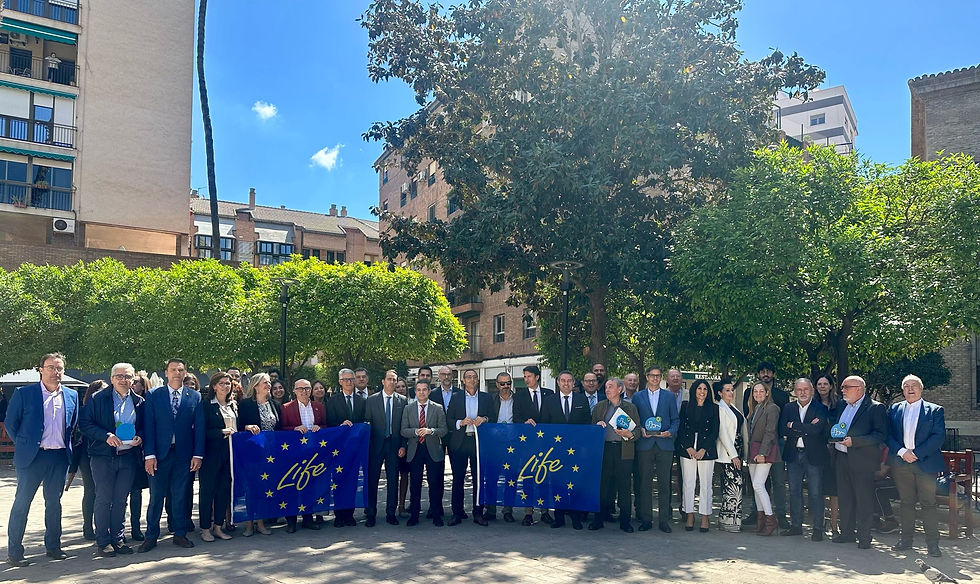Molina de Segura recognises the collaboration of local companies
- LIFE CITYADAP3
- Sep 4, 2024
- 4 min read
The mayor, José Ángel Alfonso, attended the recognition ceremony held this Tuesday in the Nelson Mandela Park, in which he thanked the six local companies for their collaboration in the pilot actions developed within this initiative, contributing to the urban adaptation of the municipality to the effects of climate change.
The Mayor of Molina de Segura, José Ángel Alfonso, this afternoon presided over the ceremony of recognition of the Molina de Segura companies that have participated in the European project LIFE19 CCA/ES/001209- CITYAdaP3, of adaptation to climate change in Molina de Segura, which took place in the Nelson Mandela Park. He was accompanied by the Councillor for European Projects, Paloma Blanco, the Councillor for the Environment, José Manuel Hernández, the Councillor for Economic Promotion, Fran Hernández Gómez, the representative of the CSR Chair of the University of Murcia, María Dolores Abellán, and the Director of European Projects of the Federation of Municipalities of the Region of Murcia (FMRM), Manuel Pato. In the Molina de Segura project, which is being carried out by the European Projects, Environment and Economic Promotion departments, the companies Eversia, Ribera Hospital de Molina, Sercomosa, Azor Ambiental, Auxiliar Conservera and Fundación Soltec have participated as co-financiers.

The councillor, José Ángel Alfonso, during his visit to the work carried out in Nelson Mandela Park, stressed that ‘what has been done here is not just a landscaping project; it is much more. It is a commitment to a greener, more resilient and fairer future. It is a demonstration that, working together, we can face the great challenges of our time, such as climate change.
‘Today we can proudly say that in Molina de Segura, not only the administrations are taking a step forward to adapt to these changes and mitigate their effects, but that companies are also committed to leaving their positive footprint in their immediate environment’, says the mayor.
LIFE CITYAdaP3, financed by the European Commission through the LIFE Programme and by means of public-private collaboration, through the Corporate Social Responsibility of local companies, has as a priority precisely the implementation of collaboration agreements to involve the private sector of the participating municipalities in the financing of actions to adapt to climate change.
The project, which has a budget of 251,706 euros, has received the contribution of 59,500 euros from the six local companies for the development of three local pilot actions: -
Basic project and execution of the Ecological House - Bioclimatic Classroom.
- Study of streets and drafting of the project for the execution of the Green Urban Path, wooded and shaded, as an example of the city's adaptation to climate change.
- Reforestation with native species and establishment of sustainable urban drainage systems in Nelson Mandela Park.

According to the councillor for the Environment, José Manuel Hernández, ‘the project, which began in September 2020, is in its last year, and once the pilot actions have been completed, it is time to highlight the value of the experiences implemented, as well as to show citizens the important participatory work of local companies that have co-financed the project, and thus recognise their efforts and awareness in adapting to climate change in the city of Molina de Segura’.
For his part, the mayor of Economic Promotion, Fran Hernández Gómez, said that ‘thanks to the support of the European Union through the LIFE programme and the commitment of local businesses, we have been able to develop an innovative model that combines the experience of the public administration with the innovation capacity of the private sector. This pilot project is an example for other municipalities. With it, Molina de Segura is a clear example of how public-private collaboration can drive the transformation of our cities.
As a token of recognition to the companies, the Molina Town Council is carrying out a communication campaign, which consists of outdoor advertising actions, such as: the poster thanking the companies in the Nelson Mandela Park; mupis installed in the clean points of the public road; or signage on the intercity bus line 32A Molina-Murcia, elements in which messages of recognition to the 6 co-financing companies are included.
A digital campaign has also been launched with a calendar of publications on municipal social networks and advertising on Facebook, Instagram and Linkedin to publicise this collaboration.
The mayor of European Projects, Paloma Blanco, has indicated that ‘this experience of public-private collaboration is fundamental, not only for the financing of projects like this one, but also to involve the companies of our municipality in the transformation and improvement of our city, through the promotion of Corporate Social Responsibility, involving them in the initiatives that, from the area of European projects, we promote’.
The project is led by the Federation of Municipalities of the Region of Murcia, with the collaboration of the Chair of Corporate Social Responsibility of the University of Murcia and the Eurovértice consultancy. In addition to the City Council of Molina de Segura, the city councils of Alcantarilla and Lorquí, from Spain, and the municipality of Reggio Emilia in Italy are also participating.






Comments